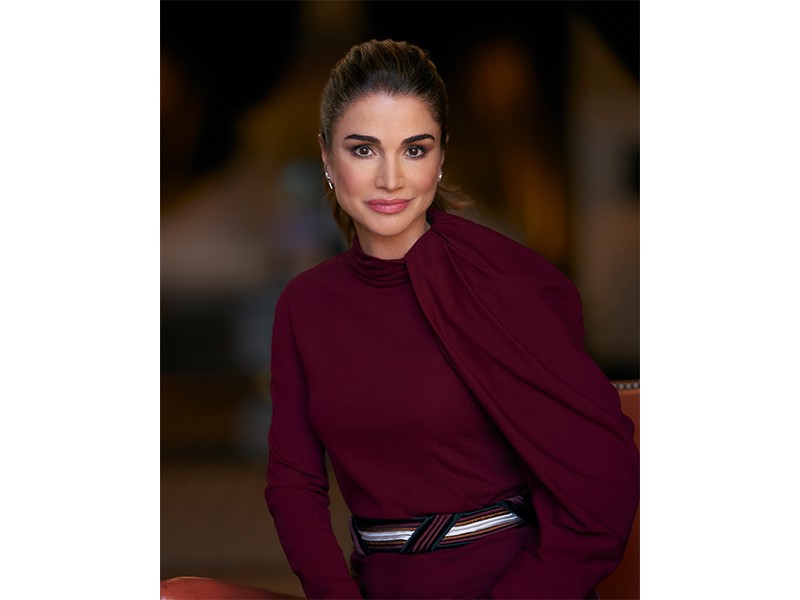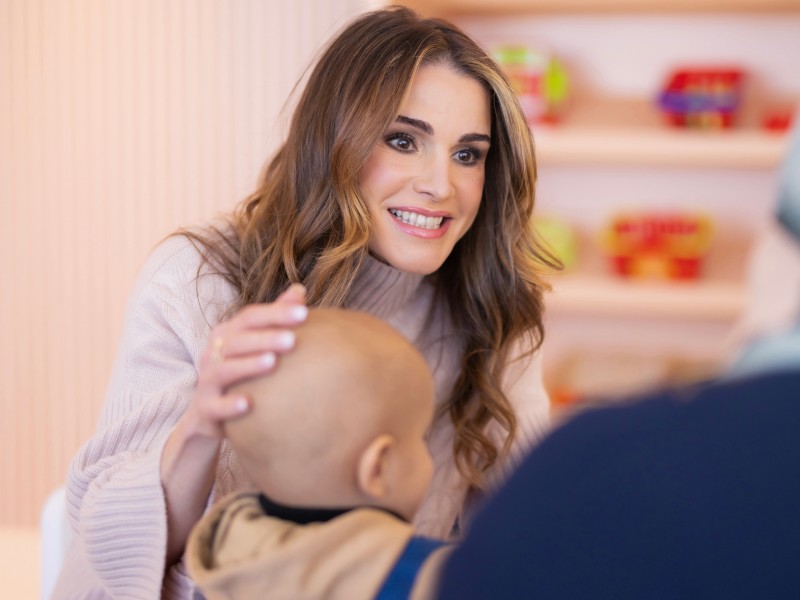In Interview with Christiane Amanpour, Queen Rania Talks about Potential Impact of Mideast Peace
Part 1:
Interviewer
Middle East peace talks are at a critical stage this weekend, Israel’s moratorium on settlements expires in a few hours, so will the talks collapse? And all this was on the mind of Queen Rania of Jordan when we sat down to talk this week. She was in New York for the UN General Assembly. Jordan, along with Egypt, are the only two Arab countries which have made peace with Israel and this Queen, a mother of four, is on a campaign to promote moderate voices in the Arab world and to counter the extremists. Your Majesty, thank you for joining us.
Queen
A pleasure, thank you Christiane.
Interviewer
There is, as you know, a peace process in place right now.
Queen
Mhm
Interviewer
Everybody’s waiting to see whether the Prime Minister of Israel keeps the moratorium on.
Queen
Mhm
Interviewer
And whether the Palestinian President stays at the talks. Do you think he should stay at the talks?
Queen
Absolutely. Um…
Interviewer
Moratorium or not.
Queen
Uh, well, that’s something to be discussed. I know that there’s a lot of cynicism and I know that a lot of people don’t believe that it’s gonna happen and it’s not easy. If it was easy it would have happened, by now. Um, but what it’s very important to emphasise is why this peace process is important. Why all, we mustn’t let cynicism or pessimism just dismiss the whole process. And if you look at the religious situation and what we are seeing here, the tensions that exist, I’m not saying that the Middle East problem, Israelis and Palestinian issue is the one that created religious extremism. Religious extremism would have existed anyway but extremists have done a damn good job of using this cause to amplify their message, you know, to try to reach the masses. And we need to realise that when there is a population that is living under occupation that are, there’s, where there’s no justice, where they can’t send their children to school, uh, where, where mothers have to deliver on checkpoints and on the other side where Israelis feel that they have to build a bubble, you know, they have to build a wall in order to exist safely because they live in such a hostile environment. That is an explosive situation that, that has repercussions, not only on our region but on our entire world. And we see those, even the debates that are going on in the States. So we have an extremely, uh, high stake and, and vested interest in seeing these negotiations move forward. In terms of the settlements that you were asking me about, you know, whether there’s the moratorium continues or not, what matters to me is what actually happens on the ground. You know, if both sides are still talking and in the spirit of peace, uh, these, the settlements are not expanded upon, then I think both sides need to be flexible as long as they continue to talk we need to see results. The Palestinian people and the Israeli people need to see change, tangible change in their lives very soon.
Interviewer
President Obama figures very strongly in this Middle East peace process of course. He has brought the two sides together. Unfortunately, Pew Polls and others now show his popularity dipping in the Islamic world, including in Jordan. But what are your thoughts on that?
Queen
Simple. Let’s see if, what happens with the Middle, if we achieve success with this round of Middle East talks, then let’s check his popularity readings after that. I think they will sky rocket.
Interviewer
You mentioned how this extremist ideology is even coming to play in the United States. You’ve seen, uh, the reaction and the fallout from the Islamic Center but it goes broader than that. Do you see a sort of a dangerous Islamophobia in the United States? How do you assess what is happening here?
Queen
Well, you know, it, it just really surprised me how inflamed this issue became. What really should be driving this debate is what is the road to reconciliation. At the end of the day this is a center that is about , uh, religious, uh, harmony, it’s about tolerance, if people understand that this is a center that does not play in the hand of the Bin Ladens of this world, but rather confronts them and undermines them, um.
Interviewer
But do you worry that people here sometimes conflate, confuse Bin Laden with Islam in general?
Queen
Absolutely. I think the major failure that we have, or that, that is going on is a inability or refusal to make the distinction between the extremists, like the Bin Ladens of this world, and the rest of the Muslims, you know, so for me Bin Laden doesn’t represent me, he doesn’t represent millions of people, millions of Muslims around the world and I think that that’s one of the worst and cruellest legacies of 9/11, is the fact that it has changed our hearts, it’s made people more fearful of people of other religions or people who look different or dress different or, and it, and it’s so contradictory to the most beautiful, uh, values of the United States. You know, people look at the United States as a leader in terms of religious tolerance and freedom of worship. You know, the people of America need to decide, do they want to continue to play this leadership role to the rest of the world, because even the Arab world, even the Muslim world, we look up to the United States when it comes to, to freedoms.
Interviewer
Then how does the Muslim world reclaim that moderate centre to allay the fears here?
Queen
I think the, uh, the Muslim world has to speak out more. Moderates in general have to speak out more, and, also, when they speak, there needs to be people listening on the other side, because this is a debate that affects how the future generations, uh, think and feel.
Interviewer
It’s the UN General Assembly and you are here in part because of the Millennium Development Goals. Now, for a lot of people that’s jargon, but what do the MDGs actually aim for?
Queen
Well, in the year 2000 world leaders came together and they made, uh, eight promises, you know, dealing with, uh, maternal health, child mortality, education, gender equality¸ uh climate change, uh, cutting down poverty. There has been some progress made but it’s been uneven. I think the food crisis, the economic crisis, the climate crisis, all those have meant that in many cases we’ve, uh, limped rather than leaped. So, uh, we have to redouble our efforts to make sure that we reach these goals.
Interviewer
In, in the ten years since 2000, what has been achieved on eradicating extreme poverty? That was one promise. Uh, making universal primary education accessible. Empowering women.
Queen
Right, uh, education and empowerment of women are two that I am concerned about, because if we reach those two they underpin success for all the other, uh, goals.
Interviewer
Many of the reports about the Arab world say that one of the reasons it lags behind the rest of the developing world is because it disempowers half its population, i.e., the women.
Queen
Absolutely, I totally agree with that. I think, you know, when you look at the Middle East and North Africa region we were one of the biggest spenders on education, and, uh, in most countries there is, uh, gender parity in terms of education, so even across twelve of the Arab States you have just as many girls as boys going to school and in many cases many more women graduating from university than men. But the problem is that although we are making these investments in women we are not reaping the benefits because they are not going into the workplace.
Interviewer
Do you get push back from some of the more Islamic party members, for instance, the Islamic groups in Jordan?
Queen
Not necessarily Islamic because Islam does not say that women shouldn’t work, you know?
Interviewer
It doesn’t but some of the political types do.
Queen
But there are, but there are certain conservative mindsets that, uh, that think that it’s either or, either you work or you have a family, you can’t do both. We are still at a very low level in terms of always female participation but women are proving themselves in the business sector. We have women in the Army, we have women in the Security Forces, um, we have female judges, entrepreneurs all over. But it’s gonna be incremental and sometimes it is generational. Um, you can’t have, you know, the Western way of doing things can’t be the, our way of doing things.
Interviewer
Your Majesty, thank you very much for joining us.
Queen
Thank you very much Christiane.
Part 2:
Interviewer
Honour killings continue in Jordan and there’s complaints that some of the laws are too lenient for those who are committing the murders.
Queen
Mhm.
Interviewer
I have read that some of the, of the perpetrators have had their sentences, you know, cut by half, many of the women are taken into, quote, unquote, protective custody, against, uh, potentially abusive spouses. This seems to be a perennial issue in, in the, not just Jordan but around, uh the Middle East and the Islamic world. Is that something that you’re still focusing on and is there room, can you improve that there in Jordan?
Queen
I feel that the association between, um, honour killings and Jordan is slightly exaggerated. Uh, honour killings do happen…we have
Interviewer
There were fourteen apparently last year.
Queen
We have about fourteen cases, which for me, one case is way too many, uh, but, you know, the, this act happens and it’s pervasive. What I want to say is that it, it’s not Islam, has nothing to do with Islam and it happens in many non-Muslim countries, so, uh, you see it in many countries where education is low, where their cultural attitudes discriminate against women. So, eh, I want to emphasise that it, it, it happens in many countries, uh, violence against women is something that we have to deal with not least of all here in the States, you know, the number of women who die as a result of, um, abuse by their spouse is too high, even here in the States, so, violence against women is something that we really have to focus on, and, eh, when it comes to honour crimes in Jordan we are tackling it head on, we’re, we’re, we, we talk about it, uh, the laws are being worked on and being changed, but for me it’s not just about laws. It’s about changing mindsets and that happens through, uh, political will, but also it happens through community leaders, religious leaders tackling it, tackling it in mosques, family attitudes changing. But we are changing and, and I know that my husband and I, you know, that’s one thing that we can never forgive is if somebody kills a sister or a daughter, um, and, and, and that’s something we really are very convinced in.
مواضيع مختارة
موقع جلالة الملكة رانيا العبدالله الرسمي
هذا الموقع الإلكتروني لا يدعم متصفحات الإنترنت القديمة. الرجاء تحديث متصفح الإنترنت إلى نسخة أحدث من إنترنت إكسبلورر 9
متصفح الإنترنت الذي تستخدمه قديم. لتحسين مستوى الأمان عند تصفح مواقع الإنترنت و مشاهدتها بالشكل الصحيح و بفعالية افضل قم بتحديث متصفح الإنترنت الخاص بك



